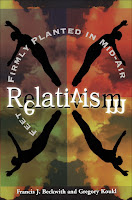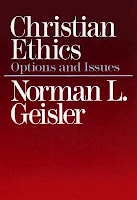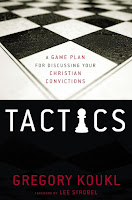God's Existence, Science and Faith, Suffering and Evil, Jesus' Resurrection, and Book Reviews
Deconstructionism, the Constitution, and Biblical Interpretation
Find other posts related to:
Biblical Inerrancy, Creation, Deconstructionism, gay marriage, homosexuality, OEC, Old Earth Creationism, Politics, Postmodernism, Science, Sources of Truth, The Constitution, truth, YEC, Young Earth Creationism
Book Review: Come Let Us Reason
Introduction
It is necessary that Christians be able to think properly. As we discuss our worldview with unbelievers and present arguments for God's existence and the resurrection of Jesus Christ it is necessary that we present sound arguments. It is also necessary that we be able to properly identify mistakes in arguments for other views so that the unsaved will see that their view is actually false and they need to change it. I read "Come Let Us Reason: An Introduction to Logical Thinking" many years ago, and it helped me greatly with being able to order my thoughts and identify incorrect thinking. This has helped me tremendously as I "tear down arguments against the knowledge of Christ" (2 Corinthians 10:5) and "provide a reason for the hope that I have" (1 Peter 3:15). I recently read the book again to refresh my memory and to write this review. As usual, the review will provide a chapter-by-chapter summary of the book's contents and conclude with my thoughts about the book.
Find other posts related to:
Apologetics, Arguments, Book Review, Book Reviews, Logic, Norm Geisler, Politics, Reason, Ronald Brooks, Theology
The Difference Between What A View Asserts And Implies
Introduction
In any discussion in which we are defending a particular view, we must present both a positive case and the negative case. The positive case shows the evidence for the view we are defending, while the negative case shows the problems with the alternative being presented. Both are necessary in the overall case. The negative case is necessary because the adherent of the other view needs a logical reason to abandon their view for an alternative. The positive case is necessary because if an adherent is provided a logical reason to abandon their view, the other view being presented may not be the only option. The way that a view is shown to be incorrect is that its claims are put to the test against reality and reason. If the claims are found to not reflect reality or they are not logical, then the view is false. However, the claims of a view can be of (at least) two different types that require a different approach. Today I want to discuss the differences in the assertions and the implications of a view or model. Understanding the differences will help us be more aware of how to properly address them in other views, and the understanding will also assist us in our formation and critique of our own views. This applies to worldviews, scientific models, philosophical theories, and really anything view that makes claims about reality, regardless of which area of reality it is.
Find other posts related to:
Arguments, critique, Logic, Philosophy, scientific model, Worldview
📚 Top 5 Books on the Bible, Creation, and Science 🔬
Scientific Challenges to Christianity
Challenges to the Christian worldview come from many different directions, but one of the most common that I see is from the direction of the sciences. Many skeptics see the claims of creation in the beginning pages of the Bible and dismiss all its contents. It is important that we, as Christian case-makers, defend the proper view of these first chapters to remove the stumbling block from the scientifically-minded skeptic. Unfortunately, there is a heated controversy among Christians on the proper interpretation of these initial chapters and the proper interpretation of scientific discoveries. This list of books that I recommend is targeted at those Christians who are interested in the sciences and/or often speak to skeptics who raise scientific challenges against the Christian worldview. They will help think through the controversy and help remove scientific stumbling blocks when challenged by skeptics. Combined, they provide the Christian with a consistent view of creation that takes into account the sciences and remains faithful to the original intentions of the biblical authors. If you have never read these books, I do recommend reading them in the order presented. For your convenience, I have linked the book titles to my chapter-by-chapter reviews and provided a short reason why I chose the books for this list, but if you really want the details and wish to be blessed by the content of the books, you will need to pick up a copy (remember to check your local library!). Now, on to the list!Book Review: Improbable Planet: How Earth Became Humanity's Home🌍
Introduction
Improbable Planet: How Earth Became Humanity's Home is the highly anticipated "sequel" to Dr. Hugh Ross' book Why The Universe Is The Way It Is. In the first work, Dr. Ross examined several biblical purposes God has for this creation and how these purposes are evidenced in the history of the universe. In this new book, Dr. Ross zooms in from the perspective of the entire universe and multiple purposes to the earth and God's purpose of redemption. His goal in this volume is to demonstrate how the history of our planet is not merely some naturalistic "just so story" but rather a complex, multi-stage project with an explicit purpose as its end-goal. He intends to marshal the latest scientific discoveries from numerous scientific disciplines to make his case for the design of our planet. Did he successfully make his case? Let's find out...Does Scripture Ground Morality, Hope, and Meaning?
Introduction
I saw this meme on social media the other day. It states "Scripture abandoned in the culture leads to relative morality, hopelessness, and meaninglessness." It caught my attention because of how its author attempts to ground morality, hope, and meaning. Even though skeptics of Christianity do not have the correct worldview, they still have the ability to identify contradictions, unsound arguments, and false claims made by adherents of other worldviews (in virtue of their being created in the Image of God). If a defender of the Christian worldview attempts to ground morality, hope, and meaning in an invalid source and defend that incorrect grounding, a knowledgeable skeptic will be able to identify the faulty claim and use that as a reason to remain skeptical of the claims of Jesus Christ. Unfortunately, this meme offers the incorrect grounding for morality, hope, and meaning. It is important that we understand how the grounding is incorrect, the implications of its being incorrect, and what the proper grounding is, so that we can be prepared to give a reason for the hope that we have when a skeptic challenges the claims of this meme.
Find other posts related to:
Apologetics, Epistemology, Ethics, hope, meaning, Morality, ontology, Scripture
Why Is The Image of God So Important?
Introduction
Those who follow this blog are aware that I not only defend "mere" Christianity, but I also defend specifics in the Christian worldview. As I have written before, I believe that if a Christian is defending an incorrect detail of their worldview to a skeptic, that skeptic can easily use that incorrect detail as an excuse to reject the entire worldview (even though this is not logically reasonable). Over the last few years of interacting with fellow Christians regarding the details of our worldview, one of the doctrines that are not discussed explicitly very often, but other debates directly affect, is the doctrine of the Image of God. I have noticed that some positions in the other debates imply different views of the Image of God, and these different views of the Image of God can be used to test the positions in the other debates. But before I get into those debates, we need to know why this Judeo-Christian doctrine is so important in the first place.Is Religion the Practice of Avoiding Truth?
Introduction
A month or so ago, I came across an interesting challenge to Christianity. A skeptic told me that religion was an exercise in avoiding truth- a willful delusion. He observed that many Christians (and religious people, in general) tend to believe the claims of their "holy" books over what has been discovered about nature, history, or the very nature of reality. He noticed that many religious people have a precommitment to a particular understanding of the world and no amount of evidence provided will persuade them otherwise. He, as an intellectual, does not want to make this same mistake. In this post, I want to explore the possibility that he is making the same mistake based upon the philosophical foundations of the claim he makes for rejecting religion, and Christianity specifically.
Find other posts related to:
agency, Blind Faith, Evolution, Faith, Free Will, God and Science, Naturalism, Philosophy, Reason, Religion, Science and Faith, Science and the Bible, Skepticism, Useful Fictions
📚 Top 5 Books For Ethics and Politics 🗽
Common Questions and Challenges in Political Discussions
- Who are you to judge someone else?
- Who's ethical system are we to abide by (if anyone's)?
- Isn't it wrong to legislate a specific morality?
- Isn't morality relative to each individual, anyway?
Top 5 Books for Discussing Ethics and Politics
- Relativism: Feet Firmly Planted in Mid-Air- Greg Koukl and Francis Beckwith
- Christian Ethics: Options and Issues- Norman Geisler
- Legislating Morality: Is It Wise, Is It Legal, Is It Possible- Norman Geisler and Frank Turek
- The Case For Life- Scott Klusendorf
- Tactics: A Gameplan for Discussion Your Christian Convictions- Greg Koukl
Why Did I Choose These Books?
Relativism: Feet Firmly Planted in Mid-Air
In any discussion about ethics and politics, a foundation needs to be established. That foundation begins with whether or not morality is objective or relative. If relative, discussions are reduced to mere opinion. If objective, then there is a correct ethic and application in politics to be discovered, and discussion involves the defense of particular views. Greg Koukl and Frank Beckwith take everyday situations and show how relative morality cannot possibly be correct. It is philosophically deep yet written in an easy-to-digest style (its not boring). This book sets the foundation for discussing ethics and politics and helps the reader to defend objective morality in these discussions.
Christian Ethics: Options and Issues
Political discussions do not always take place between two people of completely divergent worldviews; many times they are between two of the same worldview. Many Christians believe different ethical systems that they have derived from the pages of the Bible. These systems result in different applications in everyday life and in politics, so it is important that Christians understand which ethical view makes the most consistent sense of the most biblical data. Norman Geisler examines different ethical views that Christians have proposed in history and compares them to the biblical data; he provides a philosophical critique of the various views; and defends the view he believes is the accurate view. This book made my list because it guides the reader through defending the proper view, which will help defend particular ethical and political views from a logical and biblical perspective.
Legislating Morality: Is It Wise, Is It Legal, Is It Possible
In political discussions it is common to hear an objector say that morality should not be legislated because it is not wise, legal, or even possible. Norman Geisler and Frank Turek take the reader through the philosophical foundations for the founding documents of the United States of America. They also examine the logical fallacies involved with the claims that morality cannot and should not be legislated. They also spend a large portion of the book describing a model for determining what morality should be legislated and what morality should not be legislated. And how this model plays out in various hot political topics is presented. If you engage in or just listen to discussions on politics, this book needs to be read. It will help provide a powerful context for analysis and discussion of ethical and political positions.
The Case For Life
One of the big ethical and political issues of today is the topic of abortion. Discussions of abortion are often emotionally heated and rarely go anywhere because of the usual lack of a persuasive case by either side. Scott Klusendorf takes a commonly accepted source for truth that both sides acknowledge: science. He presents a powerful positive case that the unborn are unique, alive, and human. He scientifically and philosophically critiques the most common and more philosophically rigorous pro-choice arguments. He presents them in a way that is easy to understand and present in everyday discussions. This book is indispensable for the pro-life defender to present a scientifically focused case to those who value the findings of the scientific disciplines.
Tactics: A Gameplan for Discussion Your Christian Convictions
Finally, just possessing all the knowledge from the above books will not necessarily make conversations on ethics and politics productive. The person who wishes to persuade others in conversation must present their case in a winsome, respectful, and calm manner. Greg Koukl's book "Tactics" takes the reader through several different principles and real-life conversations to show how to intentionally discuss controversial issues in a non-combative posture. While this book is the last one listed, it could easily be the first one on the list that I recommend you read. You will be able to apply its principles throughout the time that you are reading through the other books and the books in any other Top 5 list.
Related Posts: Conducting Controversial Conversations
Related Posts: Ethics and Politics
Subscribe to:
Posts (Atom)














